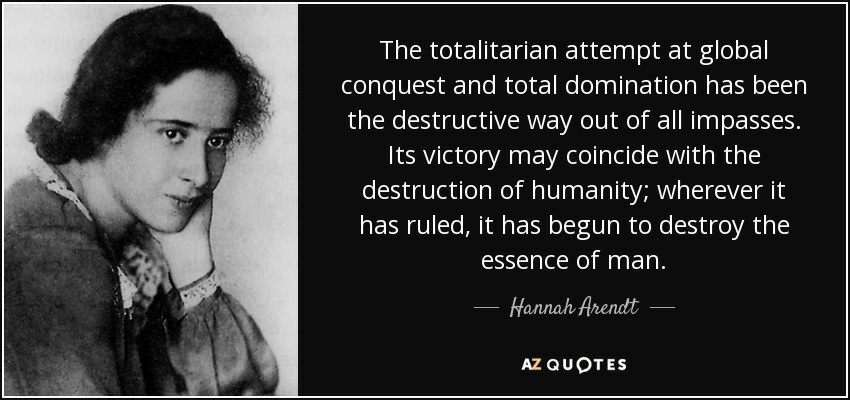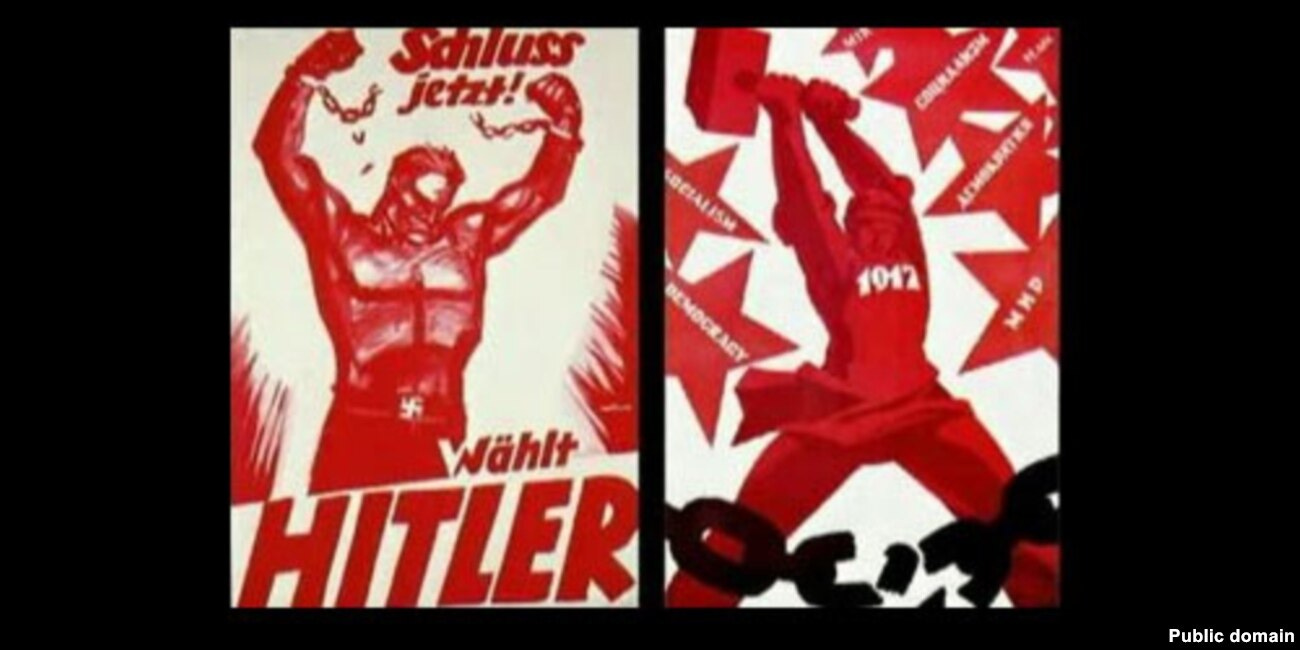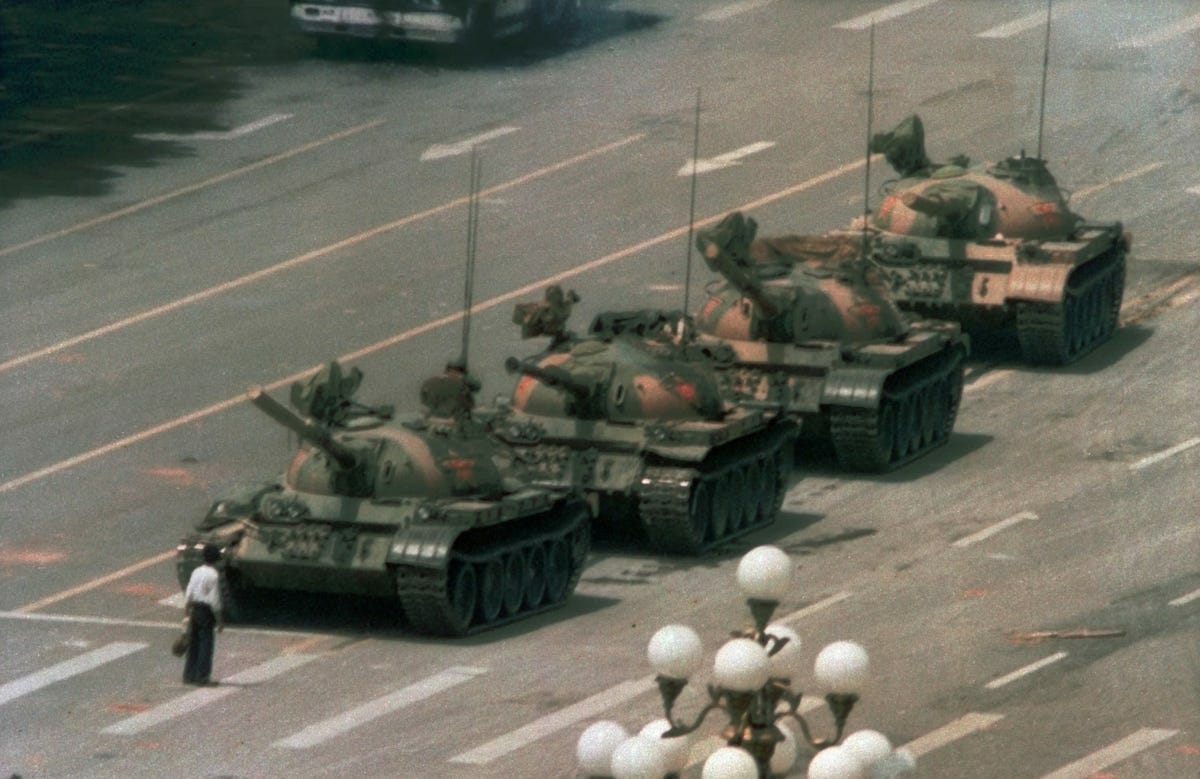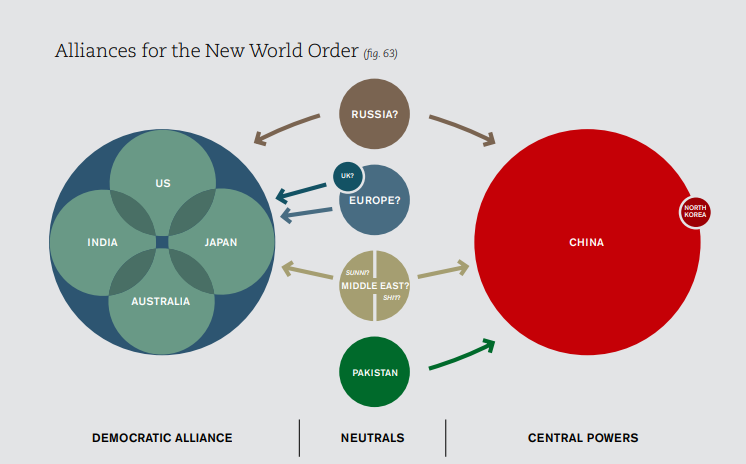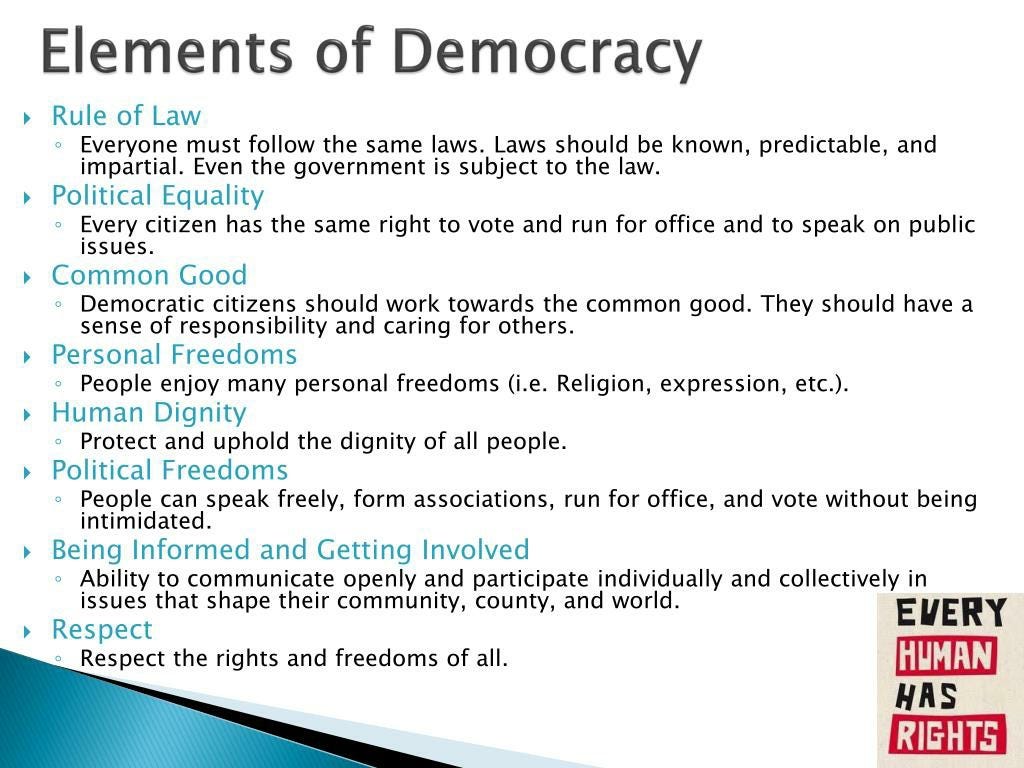Introduction:
In a world where a totalitarian regime controls everything from the news you hear to the money in your pocket and the people keeping order, the impact is huge. This setup, where information, finances, and security are tightly held, creates a powerful trio. It allows the regime to shape what people think, control the economy, and silence any opposing voices. This introduction sets the stage for diving into the complicated dynamics of how media, finance, and security work together, making it tough for those aiming to bring about change.
In 1950s, the philosopher, Hannah Arendt, was a woman who thought intensively about the nature of totalitarianism, and later identified that there is but one thing necessary for a totalitarian regime to have success. A thing that in fact also explained why, after thousands of years of political activity and social contentions, that totalitarianism has only just appeared in the 20th century.
"Interested in exploring more about Hannah Arendt's thoughts on totalitarianism? Check out her book, The Origins of Totalitarianism, and read into the complexities of her philosophical insights."
Body:
Media Control and Shaping Reality:
In a totalitarian regime, controlling the media is like having a secret weapon. It lets the regime shape stories and control what people believe. By censoring, choosing what to report, and spreading propaganda, the regime not only stops dissent but also crafts a twisted version of reality. This narrative becomes a strong tool, making people comply and blocking out other viewpoints. The media becomes a shield for the regime, keeping it safe from criticism while influencing what people think.
In November 2016, Canada witnessed the approval of Bill C-16, a legislative move that stirred discussions around the encroachment of mandated speech. This bill, with its last modification in December 2021, raises concerns about the trajectory of freedom of expression in the nation. According to a critical analysis by Rudd-O published on Nov 19, 2016, and last modified on Dec 28, 2021, Bill C-16 was approved with no recorded vote, marking a significant step towards what the author describes as legally-approved totalitarianism in the West.
The author contends that in a totalitarian regime, controlling the media is akin to possessing a secret weapon. It enables the regime to shape narratives, control beliefs, and stifle dissent. By selectively censoring, choosing what to report, and spreading propaganda, the regime not only stops dissent but also crafts a twisted version of reality. This narrative becomes a powerful tool, compelling compliance and blocking out other viewpoints. The media, in this context, acts as a shield for the regime, keeping it safe from criticism while actively influencing what people think. This analysis provides a thought-provoking perspective on the potential implications of Bill C-16 and the broader dynamics of media control in the context of mandated speech.
This media control isn't just about news; it seeps into art and culture too. The regime molds creative expressions to fit its ideology, creating an environment where disagreeing isn't just discouraged – it's almost impossible. This affects society deeply, shaping beliefs and even individual identities. The media's role as a tool for spreading propaganda in a totalitarian regime shows how powerful manipulating information is in keeping control.
Analyzing historical instances such as those captured in a collection by the website gulag.ipvnews.org (accessible here), which compiles a series of Nazi and Soviet posters, unveils a striking similarity in the aesthetic and approach to graphic design between the two regimes. This comparative collection highlights the shared characteristics of totalitarianism, rigid ideology, and personality cults present in Nazi Germany and the Soviet Union.
German text: "We've had enough! Vote for Hitler"
Russian text: "1917 -- Socialism. Democracy. Peace"
The images here showcase the visual parallels in propaganda from both regimes. This visual exploration serves as a testament to the regimes' reliance on similar graphic design elements to promote their political ideas, emphasizing the significant role of propaganda in maintaining power.
For further insight, Susie Alegre, a human rights barrister, Senior Fellow at CIGI, and author of "Freedom to Think," warns about the dangers of Big Tech controlling our thoughts in a Time article titled "We're Dangerously Close to Giving Big Tech Control Of Our Thoughts"
Despite this, opposition movements have found ways to fight back. They use underground publications, digital platforms, and grassroots efforts to share different perspectives. The battle for who controls the narrative becomes not just a political struggle but a fight for the hearts and minds of the people.
Additional sources for Nazi propaganda posters:
Financial Control and Holding the Purse Strings:
In a totalitarian regime, controlling money is key to staying in power through economic dominance. Financial institutions, tightly connected to the regime, shape economic policies that serve its interests and keep it in control. The merging of political and economic power allows the regime to concentrate wealth, using economic influence to control both local and global policies.
This link between economic interests and policymaking is vividly illustrated in the video Economic Depression and Dictators: Crash Course European History #37 by CrashCourse, where the rise of militaristic dictatorships in Germany, the Soviet Union, Japan, and Spain is explored in the context of the economic depression that set the stage for their ascent.
Locally, economic policies are designed to keep order and strengthen the regime's control, often at the expense of personal freedoms. Internationally, economic power is strategically used to achieve geopolitical goals, building alliances or putting pressure on nations challenging the regime's narrative.
Challenging financial control is complex, but strategies like economic boycotts or promoting alternative financial systems can help. Effective economic boycotts, if coordinated well, can disrupt the regime's income and highlight its economic weaknesses. Also, promoting alternative financial systems, whether through decentralized currencies or community initiatives, offers a way to lessen the regime's grip on economic structures. These strategies need careful planning and international cooperation to effectively break down the economic foundations supporting authoritarian rule.
Security and Intelligence Agencies:
The regime's tight control over security and intelligence agencies plays a pivotal role in suppressing dissent. Classified documents leaked by private contractor Edward Snowden raised serious concerns about privacy rights both in the United States and internationally. Beyond the question of personal privacy in the digital age, however, are a set of structural questions as well: How can the judicial process be transparent while still preserving state secrets? How can we draw a line to distinguish between domestic surveillance and foreign spying? How does spying strain the relationship between the President and Congress? As historian David Hadley describes, these are questions that have bedeviled American policy-makers, politicians, and citizens for over a century.
Opposition groups grapple with significant challenges under such surveillance. Constant monitoring limits their ability to organize covertly, communicate securely, or develop effective strategies. The fear of infiltration hampers trust within the opposition, making it difficult to form cohesive plans. The regime's control over intelligence creates a climate where dissent is not only discouraged but actively prevented.
Examining historical examples reveals the crucial role intelligence agencies play in regime stability or downfall. In some cases, these agencies act as loyal guardians, ensuring the regime's survival through the suppression of opposition. The potential of the National Security Agency (NSA) “to violate the privacy of American citizens is unmatched by any other intelligence agency,” especially as telecommunication technology advances. Conversely, intelligence failures or defections can contribute to a regime's collapse, as seen in instances where internal strife weakened the grip of authoritarian rulers.
(Source): America's Big Brother: A Century of U.S. Domestic Surveillance by Dr. David P. Hadley, The Ohio State University.
Overthrowing a Regime: Strategies and Challenges:
Opposition movements employ various strategies to challenge a regime with control over media, finances, and security. International support becomes crucial, as it provides resources, legitimacy, and a platform for opposition voices. Diplomatic pressure and alliances further weaken the regime's hold by isolating it on the global stage. In the face of these challenges, iconic images like the 'Tank Man' in Tiananmen Square in 1989 stand as powerful reminders of individual resilience against oppressive regimes.
The role of technology and information dissemination is pivotal in empowering grassroots movements. Digital platforms offer a space for organizing, sharing alternative narratives, and coordinating actions. However, this reliance on technology comes with challenges, as regimes often employ sophisticated surveillance and censorship methods. Balancing technological advancements with security measures becomes essential for the success of opposition movements.
Challenging a regime's control over security and intelligence requires overcoming surveillance hurdles. Historical examples illustrate the complex relationship between intelligence agencies and regime stability. Opposition movements must strategically employ international support, diplomatic pressure, and technology to weaken the regime's grip, fostering a more conducive environment for change.
In a compelling three-hour podcast on The Joe Rogan Experience, host Joe Rogan surprised everyone by engaging in a thought-provoking interview with Edward Snowden, the renowned whistleblower who exposed classified information about the NSA in 2013. This conversation gets into the implications of mass surveillance, government overreach, and the critical importance of privacy rights. Snowden's insights provide a nuanced perspective on the challenges posed by surveillance, shedding light on the delicate balance between security and individual freedoms.
The Global Context: How Other Countries Influence Totalitarian Regimes
Imagine a country ruled by a regime that controls everything from the news you hear to the money you use and the people in charge of keeping order. This regime creates a powerful trio by holding tight to information, finances, and security. Now, let's see how the rest of the world comes into play.
Author Douglas Murray criticizes the Trudeau government's handling of a peaceful protest, deeming it "absolutely totalitarian behavior." Democracies worldwide appear indifferent to what Murray calls a "scandal" involving the use of wartime laws against a peaceful demonstration. The Prime Minister's alleged slander of the truckers and their supporters has escalated, culminating in a forceful police intervention to quell the Ottawa protest. Murray contends that these actions constitute a stark display of totalitarian behavior by the Trudeau government.
In the broader context, the video prompts reflection on how countries influence totalitarian regimes. It encourages viewers to envision a nation where a regime tightly controls information, finances, and security—a powerful trio shaping its dominance.
Alliances and Opposition: A Game-Changer
Think of the world as a big playing field. The regime's stability is influenced by how well it plays with other countries. If the regime makes friends with powerful nations, it's like having teammates who support it. These friendships can make the regime stronger economically and politically. Trade deals and alliances with big players help the regime resist challenges from the outside.
But what if other countries don't like what the regime is doing? It's like facing tough opponents on the field. If the regime's actions go against global rules or human rights, other countries might not be happy. They could team up against the regime, using things like sanctions or even military actions. So, making friends is crucial, but making enemies can bring a lot of problems.
Understanding how the regime fits into the big picture of world relations helps us see the challenges and opportunities it faces on the global stage. For instance, recent developments, such as the EU agreeing on more sanctions against Russia on December 14, 2023, highlight the tangible consequences of international dynamics.
(Source): Reuters By Julia Payne and Andrew Gray
Conclusion:
Overthrowing a regime entrenched in control over media, finance, and security agencies is a multifaceted challenge laden with complexities. The orchestrated manipulation of information through controlled media, economic dominance through financial institutions, and the suppression of dissent via security agencies create a formidable triad of power. This interplay shapes public perception, economic structures, and political conformity, making opposition a daunting task.
A successful approach necessitates a multi-faceted strategy. Internal resistance must harness creative strategies to counter propaganda, utilizing underground channels and digital platforms to disseminate alternative perspectives. Simultaneously, international support becomes crucial, providing resources, legitimacy, and a platform for opposition voices. Diplomatic pressure and alliances weaken the regime on the global stage, challenging its narrative.
As we reflect on the power of collective action, we can draw inspiration from diverse movements, including the monumental Canada Truckers Protest in 2022. This demonstration, marked by a convoy of hundreds of vehicles, voiced dissent against COVID-19 vaccine mandates, serving as a powerful reminder of the complexities inherent in civic engagement.
Strategic planning is paramount, encompassing economic boycotts to disrupt revenue streams, the promotion of alternative financial systems, and the use of technology for grassroots empowerment. The battle for narrative supremacy is not just political but a struggle for the hearts and minds of the populace.
Ultimately, upholding democratic principles and human rights should be at the core of any endeavor to oust an oppressive regime. The global community's vigilance plays a pivotal role, ensuring that the pursuit of freedom and justice prevails over authoritarian control. In facing these complexities, a united front that combines internal resilience, international cooperation, and unwavering commitment to democratic values becomes the beacon of hope for a brighter, more just future.




